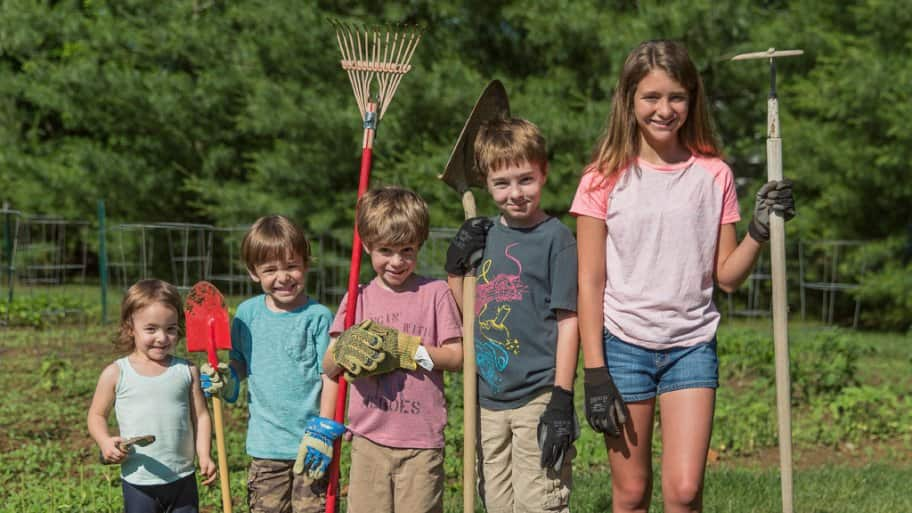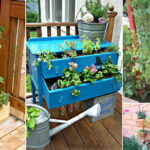Yard work, often perceived as an arduous chore, can offer children a plethora of benefits that extend far beyond the clean, well-tended garden. Engaging in yard work not only instills a sense of responsibility but also contributes positively to children’s emotional and psychological well-being. The question, then, arises: at what age should children begin participating in these outdoor tasks? This inquiry necessitates an exploration of age-appropriate tasks that align harmoniously with children’s developmental stages.
Before delving into specific responsibilities, it is vital to acknowledge the myriad benefits that yard work provides. Yard work encourages physical activity, fosters an appreciation for nature, and, perhaps most importantly, enhances mood through the release of endorphins. The act of gardening, sweeping leaves, or even planting seeds can facilitate a connection between children and their environment, instilling a profound sense of achievement with each completed task. Furthermore, being outdoors has been shown to alleviate anxiety and depression, thereby nurturing overall mental health.
When considering when children should commence their involvement in yard work, we can delineate activities based on their age while recognizing that individual readiness may vary. Below, we explore age-appropriate chores suited to various developmental stages, ranging from preschoolers to teenagers. Each age group bears unique capabilities and should be entrusted with tasks that challenge yet do not overwhelm them.
Preschoolers: Nurturing Early Enthusiasm
For children aged three to five, yard work can be an enchanting and stimulating experience. At this tender age, children are often bursting with curiosity and exuberance. It is essential to leverage this enthusiasm by introducing them to simple tasks that foster a sense of accomplishment.
Seed Sowing: The Magic of Growth
One of the most delightful activities for preschoolers is seed sowing. Providing children with small packets of easy-to-sow seeds, such as marigolds or sunflowers, allows them to experience the joy of planting. Teaching them how to make small holes in the soil and place seeds will not only introduce them to the concept of growth cycles but also enhance their fine motor skills.
Watering Plants: A Sensory Delight
Watering the plants using a small watering can presents a splendid opportunity for sensory experience. Children can revel in the sensation of cool water on their skin as they nourish the flora. This task, albeit simple, cultivates a sense of responsibility as they learn that plants depend on their care for survival.
Involving preschoolers in these tasks lays the foundation for a lifelong appreciation of nature while bolstering their self-esteem and promoting emotional resilience. The positive feedback stemming from their active contribution can lead to enhanced mood and optimism.
Elementary Age: Cultivating Ownership
As children transition into elementary school (ages six to twelve), their capabilities expand, and they can tackle more demanding chores. It is crucial to introduce tasks that not only promote autonomy but also require critical thinking and planning.
Weeding: A Lesson in Persistence
Weeding is an excellent task for children in this age group, as it demands both observation and persistence. Kids can learn to identify unwanted plants and understand the importance of maintaining a healthy garden ecosystem. Allowing them to choose which weeds to pull and how to approach the task fosters critical thinking.
Raking Leaves: A Heartfelt Connection to Seasons
Raking leaves is another appropriate task that invites elementary-aged children to engage physically with their environment. This chore provides an opportunity to explore the changing seasons and emphasizes the cycle of life. Moreover, children can derive immense satisfaction from creating neat piles of leaves, which can later be used for imaginative play, thereby merging work with creativity.
Additionally, tasks performed during this developmental period can enhance social skills when done jointly with peers or siblings. Engaging in group yard work can solidify friendships and create lasting memories, ultimately contributing to positive emotional experiences.
Teenagers: Embracing Responsibility and Independence
By the time children reach their teenage years (ages thirteen to eighteen), they should be ready to undertake substantial responsibilities in yard upkeep. At this stage, chores can become more complex, involving both critical thinking and problem-solving skills.
Landscape Design: Encouraging Creativity
Teenagers can engage in landscape design, allowing them to express their creativity. They might be tasked with designing flowerbeds or planning a vegetable garden. This responsibility requires them to research plant care and understand the aesthetic appeal, thus marrying creativity with practicality.
Mowing the Lawn: A Rite of Passage
Learning to mow the lawn is often perceived as a rite of passage for many adolescents. This task not only cultivates a sense of accomplishment but also underscores responsibility. Mowing requires a degree of skill, attention to detail, and time management, all of which are integral components of adult life. Successfully completing this chore can elicit a sense of pride in one’s ability to care for one’s living space.
Moreover, contributing to the maintenance of a home fosters a sense of belonging and connection to one’s family and community. This connection can be fortifying during the tumultuous teenage years, as it allows for personal growth and a sense of purpose.
In conclusion, engaging children in age-appropriate yard work can yield profound benefits that extend well beyond the immediate task at hand. From preschoolers delighting in seed sowing to teenagers mastering lawn care, each engagement contributes to emotional well-being, fosters independence, and nurtures a lifelong connection to nature. As such, parents and guardians are encouraged to initiate children into these tasks, not only as a means of maintaining the outdoor space but also as a vital investment in their overall development. Create a nurturing environment where yard work transforms from an obligation into a mood-boosting experience rooted in joy, creativity, and accomplishment.









Leave a Comment